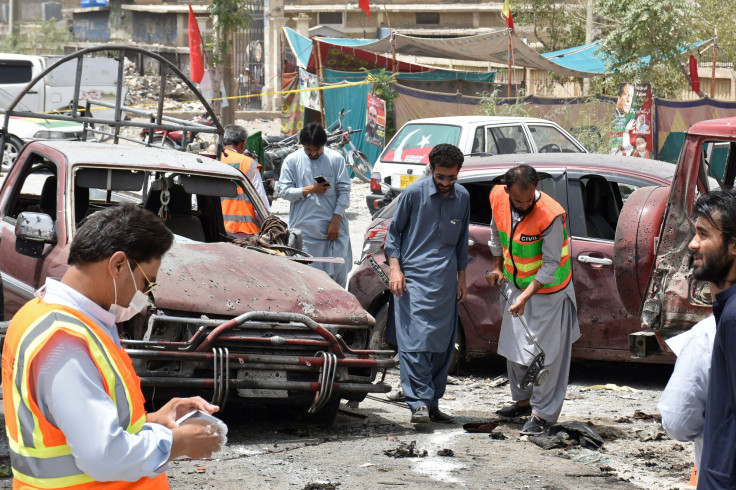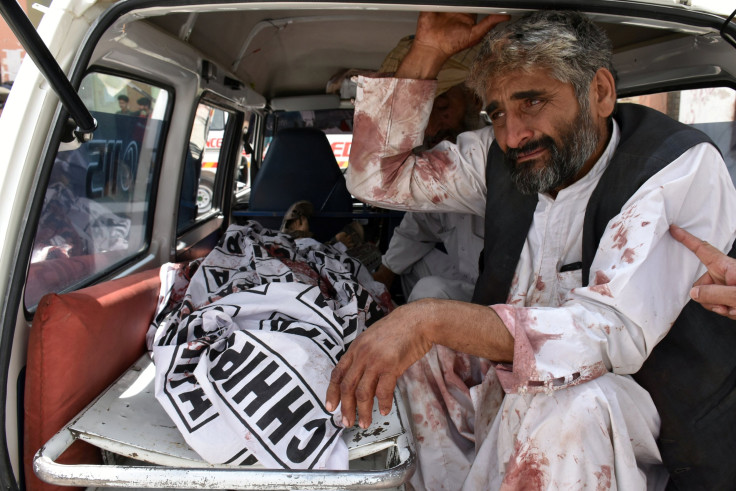Pakistan General Elections 2018: At least 35 Dead Amid Violence Throughout Country

Pakistan elections were marred with violence as at least 35 people were declared dead due to blasts and other poll-related violence around the country.
Thirty one people, including five police officers and two children, were killed in a suicide blast near a polling station in the city of Quetta in Balochistan province. More than 35 were injured as well.

In other separate incidents, three were killed in a firing in Khyber Pakhtunkhwa, one of the five administrative provinces of Pakistan located near the international border with Afghanistan. A firing in Swabi district between Pakistan Tehreek-e-Insaf (PTI) supporters and those from the securalist Awami National Party (ANP) in the same province killed one and injured three.
Dawn reported the Pakistan Peoples Party (PPP) had asked the Election Commission of Pakistan to take note of firing and open display of weapons in Balochistan. They claimed there were attempts being made to keep voters away through aerial firing in the district of Kech, and added there was an open display of weapons in Killa Abdullah district.
انتخابی قوانین کی کھلے عام خلاف ورزیاں، پاکستان پیپلزپارٹی کا الیکشن کمیشن سے نوٹس لینے کا مطالبہ
— PPP (@MediaCellPPP) July 25, 2018
این اے 271 کھیچ میں ووٹنگ کی شرح کم کرنے کے لیے فائرنگ کرکے خوف وہراس پھیلایا جارہا ہے
این اے 263 قلعہ عبداللہ میں پی پی مخالف امیدوار اسلحے کی کھلے عام نمائش کررہے ہیں
More minor incidents were reported all over Pakistan. Due to consistent violence and a prior suicide bomb attack earlier this month, which killed around 150 people, Khyber Pakhtunkhwa was tense.
A reporter covering the election tweeted PTI supporters in Waziristan, where Mohsin Dawar of the Pashtun Protection Movement (PTM) is contesting, are barring entry of PTM supporters at the polling booth. "These are selections, not elections," he tweeted.
Worrying claims coming out of Waziristan, where Mohsin Dawar (@mjdawar) of the Pashtun Protection Movement (PTM) is contesting. The PTM has ferociously criticised Pakistan's army. Here, supporters say they are being barred from voting. "These are selections, not elections," https://t.co/PsGUNFwOu5
— Memphis Barker (@memphisbarker) July 25, 2018
A hand grenade attack in Larkana district of Sindh province left three injured. In Landhi, Karachi, a fight broke out between two rival political parties. Another fight broke out at a women’s polling station in Peshawar in Khyber Pakhtunkhwa, where the process was stopped.
فیروزوالہ میں بھی ن لیگ اور پی ٹی آئی کارکنان جھگڑ پڑے#HumElectionUpdates pic.twitter.com/bxB2ONYiAe
— HUM News (@humnewspakistan) July 25, 2018
Though the Guardian reported there were 13 transgender persons running for office today, transgender people were not allowed from voting in a men’s polling station.
Pakistani daily newspaper Dawn reported seven people including one woman were arrested from various polling stations in Karachi for vote rigging.
Reports showed a Pakistan Muslim League-Nawaz candidate physically assaulted a PTI nominee in Lahore. Polling in the constituency was suspended and six people were taken into custody. A voter was also reportedly slapped in Lahore by the police.
Over 106 million people registered to vote this year to choose a new provincial assembly, parliament and prime minister. Polls opened up at 8 a.m. local time Wednesday (11 p.m. EDT Tuesday).
There are 272 directly elected seats in the National Assembly, in which 70 seats are reserved — 60 for woman and 10 for minorities, allocated on a proportional representation basis. A party needs at least 137 directly elected seats to form a government on its own. And, 570 seats in four provisional assemblies are also up for grabs. More than 11,000 candidates are contesting in the elections.
This time, the three main parties contesting the elections are Pakistan Muslim League-Nawaz (PMLN), PTI and PPP. Shehbaz Sharif, former Prime Minister Nawaz Sharif brother, leads PMLN. PTI is led by cricketer-turned-politician Imran Khan. Bilawal Bhutto Zardari, son of the assassinated former Prime Minister Benazir Bhutto, leads PPP.
The Guardian predicted the election is two-horse between PTI and PMLN, with the polls leaning more towards PTI. But even if either of the parties gains a higher number of seats, predictions are that vote result will end in a hung parliament. This means the winning party will need support from some of the 27 smaller groups for a majority.
© Copyright IBTimes 2025. All rights reserved.





















